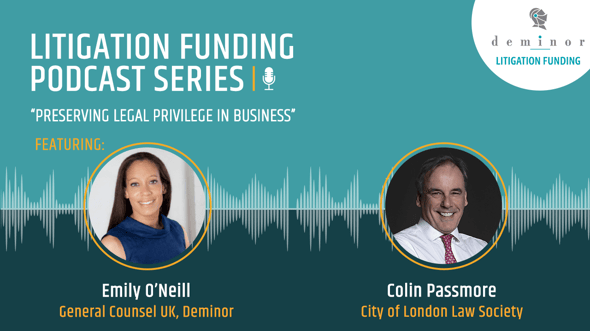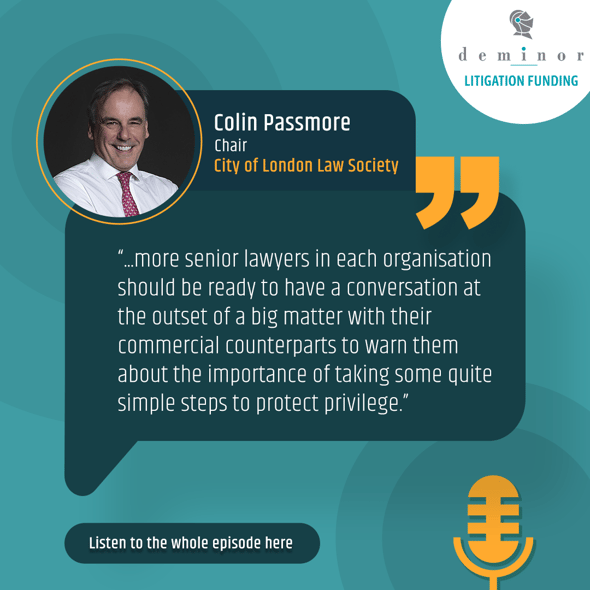In this podcast series, Emily O'Neill General Counsel UK for Deminor Litigation Funding, undertakes interviews with global professionals to discuss different aspects of litigation and litigation funding.
Deminor welcomes you to join this conversation as we summarise the key elements of the discussions between Emily O'Neill and these experts, as captured in the podcast transcripts below.

Podcast Preface:
Deminor General Counsel UK, Emily O'Neill (EON), speaks with Colin Passmore (CP), an authority on privilege and Chair of the City of London Law Society.
In this interview with Emily, Colin discusses how in-house counsel can best preserve privilege in advice they give to their businesses and shares tips to avoid losing privilege.
Podcast Transcript:
EON – In-house privilege is something which has been a big issue for me during my career and has been a real source of discussion at a lot of the in-house meetings that I go to. How to maintain it, what are the best practises and then what are the risks?
So obviously, disclosure risk, but also where you have US businesses, there's also a risk of being subpoenaed. No organisation wants to see their in-house counsel giving evidence in court.
So today, I am joined by Colin Passmore to talk through the different types of privilege and the different steps that in-house counsel can practically take to maintain privilege.
EON – Is the advice that in-house counsel give to their businesses privileged?
CP – The starting point is that under English law, in-house lawyers and in-house counsel are in exactly the same position as your external advisors. So, whenever you give legal advice, whether it's on an interpretation of a statute, a statutory instrument on a contract, whether you're drafting a contract, whether you're giving legal advice on the merits of an investigation, or litigation, the simple test I use is if it would be privileged for an external counsel, then it's going to be privileged for you.
Now, there are obviously some caveats here. The first one is that very often, in-house lawyers don't just give advice on legal issues; they will get dragged into some of the commercial issues. I've certainly seen examples of where lawyers have actually been the deal makers, the deal negotiators. As a lawyer, no matter whether you're employed as a lawyer, if you get sucked into the deal-making side, or you're giving commercial advice, or even if you're the company secretary giving secretarial advice, that is not privileged.
I think the second point to remind everyone of is in-house; you must be employed as a lawyer, so you should be a member of the legal department. If you are a lawyer, but you're in the deal-making team, the M&A team, so you're not employed as a lawyer, then the advice you give will not be privileged because you have to be a lawyer or employed as a lawyer when giving that advice. It also follows that, just as with external law firms, if you've got secondees, Australian or New Zealand qualified lawyers, or trainees in your team - If they're working under the supervision of the lawyers, their advice will also be privileged.
The third thing you have to bear in mind, just as we do with external counsel, is when we're talking about legal advice privilege, you have to bear in mind Three Rivers (No.5)[1]. This is what I call the wretched Three Rivers (No.5), wherein the context of advising a large organisation, usually a company, you have to be able to identify those people who are regarded as the privileged client, i.e., those whose job it is to give you instructions and to get your advice.
Now, the problem with this in an in-house context is that very often, you're asked to give advice out of the blue very fast. I just need a quick piece of advice. “Can I pick your brain?” “What's the answer to this?” You cannot internally say, “Whoa, stop. Who's my client?” because the whole business would break down. Where this is important, though, is if you have a large investigation, if you spot a large problem, which you know needs to be looked at, even if you have a large M&A deal, a lot of businesses make the mistake that 50 people will be involved in the negotiations going back and forth to the lawyer - who is your client? You have to try in those circumstances, as much as it will irritate the business to say: I need to work out some basic parameters around privilege. But as I said, you can't do that for everything you do. You can't have the privileged tail wagging the business dog.
So, think about the big matters. You've been selling a product, you get wind that there may be some problems with it doesn't mean to say there's litigation, but you know you've got to go and investigate it. That's where you need to know who your client is, and that's when you need to, as importantly, identify who is not your client because those are the people who tend to say, oh, my goodness, this is a problem, and thereby they've created unprivileged, potentially disclosable material.
To summarise, the three things are normally: all your advice is going to be privileged, so long as it's legal and not commercial advice. Make sure you are employed and engaged as a lawyer within the business. And then, finally, just keep Three Rivers in mind for those bigger occasions.
EON – ‘Employed as a lawyer’ - Does that mean you need a practising certificate?
CP – The reality of our practising certificate regime is that every lawyer must have a practising certificate. Unless, and there is this amazing exception, unless you're employed within the government - and the only reason I know of for that exception is to save the government money. But you must have a practising certificate.
So there's a bit of a myth that if you're in-house and you're a tax advisor, you don't need a practising certificate. I don't know where that comes from. Everyone should have a practising certificate who is qualified as a lawyer, but thereby, because you have a practising certificate doesn't mean to say everything you do is going to be covered by privilege. So you've got to remember the three rules that I've already outlined.
EON – And how about employed barristers?
CP – As long as they are employed as lawyers within the legal department, subject to your or another senior person's supervision, no issue.

EON – Thinking about the type of advice that in-house counsel have to give in multi-jurisdictional organisations where some of that advice may be given to companies outside the UK.
I'm an English qualified lawyer and was employed at the group level in the UK but with a global remit. I had to advise our US subsidiaries on risks relating to US patents, so not squarely English subject matter.
How does privilege apply in that context?
CP – English law of privilege can only be asserted in an English court. So, the fact you are giving English privileged advice to a US entity; let's suppose that entity gets into litigation in California, New York, or Washington, it'll almost certainly be the local rules of privilege that will apply.
Now, there are a number of jurisdictions where the rules differ to England. For example, if any of your listeners have subsidiaries or head offices in Australia, Australia is much more focused on whether in-house lawyers are actually giving legal advice. So, you would need to get Australian law advice on the current position there because you can't assume that what is privileged here will be privileged there. It's quite extraordinary, I've seen many attacks on in-house lawyer privilege in Australia, but it virtually never happens in England. The court's opponents treat our privilege with considerable respect.
The other jurisdiction you must always keep in mind is in certain states in the US. Particularly if you're doing a cross border transaction, because what is privileged here won't be privileged there. And so, for example, you can waive privilege quite happily under English law, but it could have devastating consequences in New York. So again, on the big matters, you really need to get your teams, your external advisors, to work out what are the privilege rules right at the outset. No good doing it when a problem arises.
In summary, the watchword is by all means, you can share privileged material with subsidiaries, but you've got to be aware that some jurisdictions just simply have different rules.
EON – Looking in the context of a larger transaction and different types of communication which might include legal advice and commercial advice, how can in-house lawyers mitigate the risk of losing privilege in those kinds of mixed communications, which are often email, maybe with some attachments.
How can in-house lawyers safeguard privilege in that situation?
What are the things that in-house counsel can really think about in assessing where they need to take extra steps?
How can in-house counsel avoid the privilege-tail wagging the dog?
CP – The first point is that the counsel must work out how important privilege is to their business. Now, my experience is that the vast majority of businesses actually take privilege quite seriously, and therefore, within reason, this is the privilege-tail point, and they will be amenable to taking steps to look after the privilege. I think, therefore, that the more senior lawyers in each organisation should be ready to have a conversation at the outset of a big matter with their commercial counterparts to warn them about the importance of taking some quite simple steps to protect privilege.
As I said earlier, where you've got a cross-border matter, whether that's the UK/US or the UK/Asia, because bear in mind, for example, Three Rivers (No.5) isn't followed in Hong Kong or Australia. They can create what, in their eyes, is privileged material. Under our rules, if only legal advice privilege is available, it's not privileged here. So, you have to have those conversations at the outset.
But then, in terms of the business, what you've got to get across is, first of all, not everybody can communicate with the benefit of privilege with the lawyers. So, you come back to this point: Who is the client? Who is the privileged client? And if senior businesspeople don't quite get that, the best example is: there are many people in this transaction, whether it's an M&A transaction, whether it's trying to find out what was the genesis of this product - Why has it gone wrong? How was it developed? How was it tested? There are many people who will communicate without the benefit of privilege because they're outside the scope of the client. Those people will be creating potentially disclosable material. And so you've got to identify who can, who can't.
And with the can'ts, they have got to be careful what, if anything, they put into writing. We've all seen it. “This product is rubbish. I can't believe we put this on the market. Who on earth approved this? They need their head seeing to.” Who hasn't seen those kinds of emails? And it's so easy on email. People don't think enough about what they're writing. So that is very, very important.
We then come to my favourite paragraph in my favourite court of appeal case, which I think all in-house lawyers should read - just this paragraph if you don't have time to read the judgement, from 2021 - it’s called Jet2[2]. In paragraph 100, Lord Justice Hickenbottom sets out guidance on the do's and don'ts of internal email chains, and this is the bit that I think causes the problems…What this paragraph makes clear is that if you mix lawyers with their privileged clients and with other people in the business, all on the same chain, you know what happens. You get an email pile on. Everyone needs to justify their existence and have their say so everyone answers, but not every answer is going to be privileged. So, the lawyers, I think, have to be really disciplined. “This is a request for instructions.” “This is my advice, based on those instructions.”, “These are the people it needs to go to”. If the business comes back and says, “well, actually, we need a commercial decision here”. Everyone must realise, that should be on a separate email chain. Not always feasible, I accept. But in any event, that will not become privileged just because the poor in-house lawyer has been copied in. And when you get into a dispute, as sometimes you will later on, a whole bunch of paralegals and AI machinery are going to have to go through thousands of emails asking: Which one is privileged, and which one isn't?
And someone, probably the senior in-house lawyer, is going to have to do a witness statement to with a statement of truth stating “This is privileged, this isn't”. So, you've got to really think about these email chains. Same with WhatsApp, same with all other quick, fast electronic mediums for communication. You've got to try and be disciplined. We don't need everyone on this email chain, just as we don't need everyone on this call. And it's not easy because the business will say, “sorry, I haven't got time for this, we've got to get on with it. We've got to get on with it.” We've all been there, but those are the things that you've got to think about.

EON – 'I'm employed by one group company, but I'm providing advice to another group company. They're not my employer, but they're within the group '
Does that impact who is the client for the purposes of the advice? And what steps can I take to make sure that I've protected myself adequately?
CP – There's three issues here.
It doesn't happen like this in practice, but this is just something to think about; it would be fantastic if every employment contract said: “you are employed to give advice to X PLC and all of its subsidiaries all over the world.”
The second thing is you've got to distinguish between giving advice to a subsidiary and sharing advice with a subsidiary. And the two are very different. Three Rivers will apply to the first situation, but it does not apply to the second situation.
I've always taken the view, and there is an Australian case called Seven Networks discussed in chapter four of my book which will be updated this year,[3] which recognises that an in-house lawyer in a multi subsidiary entity can give legal advice so long as it's legal advice, it's confidential, it's your job as a lawyer to advise people in those subsidiary organisations.
The usual rules about Three Rivers will apply from an English law perspective. So, you've got to keep that in mind. The more normal position is that you have given legal advice to your board, head office, the holding company, the main company and very often the question is: “well, can we share it with the subsidiaries?” And that has got nothing to do with Three Rivers, because that is the point at which the advice is given; it's finalised and the board thinks it's so good, we should make sure everyone sees this.
The view I take and I have not seen a single case in the common law world (not including the US in that because I don't study US law), is that Canada, Australia, New Zealand, Hong Kong, Singapore, England, Ireland, Channel Islands will treat that as the sharing of privileged information. And under English law, but not US law, sharing that information on a confidential basis with a subsidiary company is going to be absolutely fine as a matter of English law.
To share it with a US subsidiary. I don't know what the answer is. You would have to stop and think what is going to happen in the US, because I have seen situations where a perfectly acceptable legitimate waiver under English law has all sorts of horrific consequences in America. But as a matter of English law, and as I say, most common law countries, New Zealand, Australia, Canada, they're going to be absolutely fine with that.
So if you've got any doubt about is there a country out there, for example, China, PRC does not recognise privilege. So if you share it with a PRC subsidiary, and I think South Korea is the same, stop and think, should they see it, should it be on their service?
EON – How about if you have taken external advice: How do you mitigate the sharing risk there?
Do we need to ensure that each subsidiary is also a client of the firm so that they are directly receiving the advice along with you?
What's the best practise in that situation?
CP – The starting point is it should be exactly the same as with the in-house lawyer's own advice - the subsidiary does not need to be a client. So if you, as general counsel, have obtained that advice from your lawyers in London. You can do this confidential sharing with the subsidiary. And English law, as I've indicated, is very, very generous in this respect.
The question mark would be those jurisdictions like PRC, South Korea possibly, and the US, what are the consequences of sharing it with a subsidiary in those countries?
Now, I'm not saying that you can't do it in the US. I'm just saying I don't know the rules, and every time I check the rules, I know there can be some challenges. But, it is perfectly legitimate to share privileged information on a confidential basis with subsidiaries within the same corporate group.

EON – We've talked about legal advice privilege, but moving into litigation privilege…
For example, 'I have an internal investigation where if the result goes a certain way, it may lead to litigation. So there may be contemplated litigation, but we don't actually know at the start when we're starting to provide advice.'
When does litigation privilege kick in? And how much broader could that be than purely legal advice privilege?
CP – If litigation privilege is available, Three Rivers goes out of the window, and therefore you can communicate with anybody in the entity within the subsidiaries as a matter of English law, so long as those communications are made for the dominant purpose of the contemplated litigation - and of course, dominant purpose applies to legal advice privilege these days.
The problem or the challenge with an internal investigation is it can well start on a non-adversarial basis so that litigation privilege doesn't apply. But it is possible that during the course of it, it becomes apparent that it is adversarial, at which point litigation privilege can kick in. Now, it is a real art skill to identify that precise tipping point, and there's no easy answer to this. You have to be at the point where you can say, from then on; it was apparent that litigation was reasonably in contemplation because we had discovered these facts that indicated that there was likely to be a claim. It's very easy to state that as a principle, it is difficult to put that into practice and identify that tipping point in a particular case.
There are instances in the case law, and I think one of the PAG RBS decisions about six or seven years ago had this precise point. A regulator wanted information out of the bank but made it clear that they were engaged in a fact-finding exercise only. So, it became virtually impossible to say, “well, we were pretty sure litigation would follow out of this.” And the court held, “well, no.” They made it clear they were only after facts, and they needed those facts to have that later deliberation. Whether there’s something here, we should investigate.
There was another case a couple of years ago where this exact problem arose at a Luxembourg bank called State of Qatar v. Havaland. It was a first-instance decision, maybe three or four years ago, where a regulated entity realised something had happened and knew they needed to make a report to their regulator. They engaged accountants to come in and help investigate what had happened, and the terms of engagement of the accountants made it clear that they were there to investigate what had gone wrong. It was only about six weeks later, that the bank realised having made reports to the regulator, having got the accountants up and running, there was likely to be litigation. The whole issue there was at what point did litigation privilege kick in? The consequence of this was that the majority of the work of the accountants was unprivileged, and that was because no one thought about this at the outset - What exactly was the accountant's role? But also, were we in a position where we could say litigation or regulatory consequences were in contemplation such that litigation privilege kicked in?
Again, a very difficult one. There were various competing events as to when litigation would kick in. The judge found that it kicked in at quite a late stage and made the point, rather nicely quoted from my book, that it's quite difficult to identify this tipping point where you go from non-adversarial, i.e., Three Rivers, legal advice privilege, to adversarial, where Three Rivers falls away, and litigation privilege, with its much wider scope, kicks in. Had litigation privilege been available, it was quite possible that the accountant's work would have fallen within the scope of litigation privilege. In this case, it didn't.
EON – You talked about the tipping point between moving between legal advice privilege and litigation privilege.
Can in-house counsel help identify when that is?
So if you're responsible for an investigation and some facts are uncovered, which you think means that litigation could be reasonably contemplated, could you put a stake in the ground by sending an email to the people you've identified as your kind of client team to say: we found these facts, and now there is a litigation risk, and so litigation privilege will now apply so that at least there's something that you can point to when or if that assessment is made later.
CP – I think that is precisely what a top litigator, in-house or external, should be willing to do. After all, if the matter goes to court, that's what the judge is going to have to decide. So why can't you have a go? You're there in the thick of it, and you should be doing exactly that.
Of course, it's a brave decision in the sense that you're setting yourself up to be knocked down, and you're going to be attacked. But what I often say is you should prepare a note of all the reasons why, at that point, you thought litigation privilege was in contemplation, such that the privilege kicks in. And you should be ready to disclose that note. There is a waiver issue there, but of course, waiver is limited to what we call the single transaction, which in this case would be the note you wrote as the in-house lawyer on why you thought litigation privilege kicked in at that point.
If there are 100 emails amongst a small team, including external advisors, asking: Do we think we've reached the point where litigation privilege has kicked in? Those could arguably be disclosable if you use this note at a later stage if you get challenged, i.e., you did it four weeks too early.
But I would always say, make that note and be ready to disclose it. Shut down as far as possible all other communications around this point, because you then limit the amount of potential additional disclosure. But I think litigators should be ready to do it.

EON – Considering the context of litigation disclosure more broadly…
Deminor is a litigation funder - we want to see opinions from law firms around the cases that we are reviewing as part of the due diligence. US counsel are very keen on a common interest agreement to help to preserve privilege for some of the things that they're disclosing to us.
What's the risk of disclosing to third parties in the context of litigation? (e.g., an accountant or a funder) And how can in-house counsel mitigate that here?
CP – Well, look, I think the first thing to say is auditors do not have a statutory right to see privileged information belonging to the company - I think that gets overlooked. That's why I think, amongst other things, the FRC tried to get some provisions in some new company legislation overturning the Jet2 decision, which touched on that from a regulatory perspective. Of course, as a practical matter, the auditors may well say: “Well, if you don't show us this, we can't sign the audit off.”
What I've seen of late is because of the concerns that if auditors get hold of this material, they themselves can be summoned. The auditors can be summoned to produce that document, perhaps by a regulator, perhaps by an opponent in litigation with you, or it might give rise to some sort of waiver. US lawyers are very hot on common interest privilege agreements. In my view, they've got out of hand. I think I saw a 50-page one a year ago. I just don't think you need to go into that level of detail, but US lawyers, I'm sure, will have their own reasons for doing this.
What I've seen and what I've helped draft in England is taking a different, but in my view, a much better approach. I'm never convinced of the utility of common interest privilege because there is a much better way under English law, you're allowed to share privileged material with a third party – not an opponent, not an adversary. You can actually share it with a regulator on a limited waiver basis, albeit that gives rise to a whole different series of challenges and potential problems.
But in terms of sharing it with an auditor, you can do a very simple, few-page agreement that spells out that you are going to show the auditor your privileged advice from yourself or from your external advisors. You are sharing this on the basis that the auditors will treat it as privileged, as confidential if you can get them to agree that only a handful of people within the auditor's business will look at it - so you can't let them pass it around the entirety of the business. They must not quote from it, nor use it in their public documents, or put it in the audit report. They will also let you know immediately if you can get them to agree to this, that in the event someone comes to them and says: “We believe you've got the Simmons and Simmons advice; can we have it?” They must tell you immediately so that, if necessary, you can go and get injunctive relief to stop this happening.
Now, this is a uniquely English law solution. I think it would work in Hong Kong; I think it would work in New Zealand, but it probably doesn't work in Australia - they don't like the sharing rules. And I'm pretty sure it doesn't work in America. Whether you've got a problem thereby in America as well, depending on what litigation you're funding, where it is based, but as a matter of English law, that is a perfectly acceptable solution. Again, if you've got a US angle, go and get the US angle covered off. What are the consequences?
You can do a common interest privilege agreement of course, under English law. I just never quite see the point when you can share privilege because our courts have been so generous about the basis upon which you can share. And so therefore, as between clients and funded clients and funder, again, sharing advice as between those two entities on confidential and privileged terms is perfectly acceptable. An English court would be hostile to an attack to get that information out of you simply because you've shared it.
EON – The auditor's advice is very helpful. I was maybe a little bit less kind to auditors when I had to meet with them each year; I would show them the document, but I wouldn't provide them a copy.
CP – A perfectly legitimate tactic. I know a lot of audit firms hate that, and you've got someone in the room trying to scribble a note.
One point that I hope has come out of this is: privilege is so unique and so beneficial and so sacrosanct, you have to treat it like a precious Ming vase. You can't mess around with it. And that's what entities that don't have the benefit of the privilege in the way that the clients of lawyers do sometimes fail to understand. It also explains why the accounting profession tried about ten years ago in the Supreme Court, and I acted for them to get within the privilege, but we lost five two. It's a very precious thing, and so you have to look after it.
EON – Absolutely. dealing with counterparts in subsidiaries in continental Europe, where privilege doesn't have the same status and doesn't have the same impact because there's no real disclosure. It's quite difficult to explain why that's so important here and elsewhere and in other common law jurisdictions.

EON – Can you give some tips for in-house counsels?
CP – There is nothing in principle to stop you having a limited waiver arrangement with a regulator, whether that's the SFO, the Police, the FCA, the FRC, doesn't matter who it is.
The difficulty is that there is not a single regulator that will give you a cast iron assurance that there are no circumstances in which they would have to use that privileged information against your own interest. So, the FCA, for example, I think somewhere in its guidance expressly says something like: “you can give this to us on a limited waiver basis. And so far as possible, we will try to respect that, but we cannot inhibit our statutory functions. So if we need to use this, we will use it.”
There's another RBS case where this happened, and the limited waiver was attacked by RBS's opponents. The waiver was upheld because, up to that point, the FCA had held onto these documents and kept them confidential. The fact that the SEC could have come to the FCA and said: “gateway sharing powers can we see?” This was neither here nor there because it hadn't actually happened. Had it happened, it could have gone across and then you lose your privilege.
Similarly, with the criminal justice authorities, they will accept privileged information up to a certain point, but if that information is relevant to a criminal trial, the criminal trial disclosure obligations will trump your privilege and the SFO will always make it clear. And even if they don't, they will always act on the basis that the defendant's rights to a fair trial override your privilege. So, you have to be very mindful that if you are going to give privileged information to a regulator, particularly criminal justice authorities, you are going to lose control. And they won't even contemplate giving you the same assurances as you can extract from the audit firm. So, it's doable, and there are times when it's necessary, but it's really dangerous.
EON – Thanks very much, Colin. That was a proper whistle-stop tour across all types of privilege, and it's given some really good tips for in-house counsels as to how they can really manage and mitigate not only the corporate risk but their own personal risk in sharing privileged advice and advising within the business.
[1] Three Rivers v Bank of England (No 5) [2003] EWCA Civ 474
[2] R (Jet2.com Ltd) v The Civil Aviation Authority [2020] EWCA Civ 35
[3] https://www.sweetandmaxwell.co.uk/Product/Evidence/Privilege/Hardback/42654229
Litigation Funding Podcast Series - Next Steps and Further Information:
Thanks for joining Deminor's Litigation Funding Podcast Series as we dive deep into core topics in funding litigation.
Keep an eye out for our upcoming conversations as Deminor General Counsel UK, Emily O'Neill, speaks with several more experts to get their insights into different aspects of litigation funding.
If you would like to connect with either Emily or Colin on LinkedIn, please click on the links below:
Emily O'Neill – Deminor General Counsel UK and Global IP lead
Colin Passmore – Chair of the City of London Law Society
***
Further Reading:
- https://www.deminor.com/en/case-studies/co-funder-proposes-sharing-of-litigation-funding-risk-to-leverage-deminors-in-house-due-diligence-capability
- https://www.deminor.com/en/case-studies/financing-assertion-of-patents-protecting-manufacturing-processes
- https://www.deminor.com/en/case-studies/telecoms-patent-assertion-multi-jurisdictional-campaigns
- https://www.deminor.com/en/case-studies/canadian-innovative-start-up-preparing-for-a-david-v-goliath-litigation-funding-battle
- https://www.deminor.com/en/case-studies/whats-the-risk-assessing-the-risk-of-counter-assertion-by-the-defendant-in-patent-litigation
- https://www.deminor.com/en/case-studies/overstepping-the-mark-litigation-funding-trade-mark-infringement
- https://www.deminor.com/en/case-studies/lights-camera-action-recovering-damages-for-infringement-of-rights-in-a-short-film
- https://www.deminor.com/en/case-studies/recovering-damages-for-stolen-software-through-litigation-funding
- https://www.deminor.com/en/case-studies/funding-in-the-pharma-sector-/-investing-in-a-case-where-litigation-is-already-ongoing








